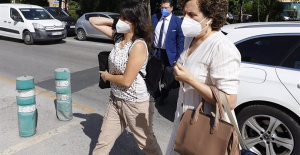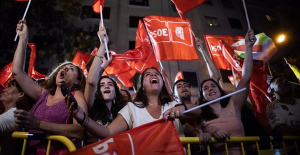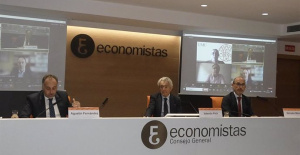The TSJCL acquitted one of the three convicted and drastically reduced the sentences of the other two
MADRID, 17 Nov. (EUROPA PRESS) -
The Criminal Chamber of the Supreme Court (TS) will deliberate on November 29 the appeals filed against the sentence handed down in the so-called 'Arandina case', with which the Superior Court of Justice of Castilla y León (TSJCL) acquitted one of the three convicted by the Provincial Court of Burgos - which imposed 38 years in prison on each one - and reduced the sentences for the other two to four and three years in prison.
According to the legal sources consulted by Europa Press, the Second Chamber will study the appeal filed by the Prosecutor's Office against said sentence in 2020, for which reason the aforementioned sources emphasize that it is the normal course of appeals, even if it occurs in the middle of the controversy caused by the entry into force of what is known as the 'law of only yes is yes'.
The Prosecutor's Office did not see it as viable to appeal the acquittal, but it did consider that the sentence handed down by the TSJCL does not conform to the law with regard to the sentences imposed on the other two implicated.
The Public Ministry understands that there was an improper application of the analogical mitigation of closeness of age and proximity in the degree of development or maturity with the victim, while, thirdly, it considers that it was not appropriate to appreciate said mitigation as highly qualified.
The TSJCL modified the sentence in response to the appeals presented by the defenses of the three former Arandina footballers, convicted by the Burgos Provincial Court for crimes of sexual assault.
The Chamber understood that the facts were constitutive of a crime of sexual abuse, committed in the person of a minor, and appreciated said extenuating factors, while totally excluding one of the three convicted from responsibility.
The court pointed out that the minor's statement -assessed jointly with the rest of the evidence, testimonial, expert and documentary (video, conversations and telephone messages)- enjoyed full credibility in terms of the reality of the events that occurred in the floor room, but lacked it in terms of the way they were produced.
Specifically, he did not consider the existence of intimidation proven, when appreciating the contradictions that are revealed between his statement -in which he attributes the sexual acts with the three sentenced to the blockade caused by fear--, and the behavior observed both in the previous moments --in which he exchanged messages of sexual content with one of them and agreed to accompany him to his house the next day--, as in those immediately after --in which he left the room, to voluntarily have a sexual relationship complete with one of them in an adjoining room (stated fact proven)--.
Said contradictions, according to the ruling, show cracks in the credibility of the statement, which was not corroborated by the peripheral elements either, since neither the witness statements transmitting what the minor herself told them nor the telephone messages exchanged in a At first they allowed us to affirm that in the living room of the house she acted against her will when she was gripped by fear, a version that she later transmitted to her parents and to the counselor who treated her in Madrid later.
Consequently, the TSJCL modified the proven facts, deleting the reference to intimidation, and classified them as a crime of sexual abuse of a child under 16 years of age, where consent lacked legal significance due to the reform of the Penal Code of 2015, which raised the age of consent from 13 to 16 years.

 Exploring Cardano: Inner Workings and Advantages of this Cryptocurrency
Exploring Cardano: Inner Workings and Advantages of this Cryptocurrency Seville.- Economy.- Innova.- STSA inaugurates its new painting and sealing hangar in San Pablo, for 18 million
Seville.- Economy.- Innova.- STSA inaugurates its new painting and sealing hangar in San Pablo, for 18 million Innova.- More than 300 volunteers join the Andalucía Compromiso Digital network in one month to facilitate access to ICT
Innova.- More than 300 volunteers join the Andalucía Compromiso Digital network in one month to facilitate access to ICT Innova.-AMP.- Ayesa acquires 51% of Sadiel, which will create new technological engineering products and expand markets
Innova.-AMP.- Ayesa acquires 51% of Sadiel, which will create new technological engineering products and expand markets Juana Rivas's legal team manages to repeat the trial "that separated the brothers" in Italy
Juana Rivas's legal team manages to repeat the trial "that separated the brothers" in Italy The New York Justice annuls Harvey Weinstein's conviction for sexual crimes and orders a new trial
The New York Justice annuls Harvey Weinstein's conviction for sexual crimes and orders a new trial Socialist militants promote a large demonstration in support of Sánchez on Saturday in Ferraz
Socialist militants promote a large demonstration in support of Sánchez on Saturday in Ferraz Families with average income allocate a third of their income to paying taxes, according to economists
Families with average income allocate a third of their income to paying taxes, according to economists How Blockchain in being used to shape the future
How Blockchain in being used to shape the future Not just BTC and ETH: Here Are Some More Interesting Coins Worth Focusing on
Not just BTC and ETH: Here Are Some More Interesting Coins Worth Focusing on Retrópolis brings the golden age of video games and computing to the UPV
Retrópolis brings the golden age of video games and computing to the UPV Looking for video games that value the neighborhoods of Valencia
Looking for video games that value the neighborhoods of Valencia UPV researchers improve the efficiency of air conditioning systems using a geothermal heat pump
UPV researchers improve the efficiency of air conditioning systems using a geothermal heat pump València is committed to citiverse and smart tourism to be "the reference technological hub of the Mediterranean"
València is committed to citiverse and smart tourism to be "the reference technological hub of the Mediterranean" A million people demonstrate in France against Macron's pension reform
A million people demonstrate in France against Macron's pension reform Russia launches several missiles against "critical infrastructure" in the city of Zaporizhia
Russia launches several missiles against "critical infrastructure" in the city of Zaporizhia A "procession" remembers the dead of the Calabria shipwreck as bodies continue to wash up on the shore
A "procession" remembers the dead of the Calabria shipwreck as bodies continue to wash up on the shore Prison sentences handed down for three prominent Hong Kong pro-democracy activists
Prison sentences handed down for three prominent Hong Kong pro-democracy activists ETH continues to leave trading platforms, Ethereum balance on exchanges lowest in 3 years
ETH continues to leave trading platforms, Ethereum balance on exchanges lowest in 3 years Investors invest $450 million in Consensys, Ethereum incubator now valued at $7 billion
Investors invest $450 million in Consensys, Ethereum incubator now valued at $7 billion Alchemy Integrates Ethereum L2 Product Starknet to Enhance Web3 Scalability at a Price 100x Lower Than L1 Fees
Alchemy Integrates Ethereum L2 Product Starknet to Enhance Web3 Scalability at a Price 100x Lower Than L1 Fees Mining Report: Bitcoin's Electricity Consumption Declines by 25% in Q1 2022
Mining Report: Bitcoin's Electricity Consumption Declines by 25% in Q1 2022 Oil-to-Bitcoin Mining Firm Crusoe Energy Systems Raised $505 Million
Oil-to-Bitcoin Mining Firm Crusoe Energy Systems Raised $505 Million Microbt reveals the latest Bitcoin mining rigs -- Machines produce up to 126 TH/s with custom 5nm chip design
Microbt reveals the latest Bitcoin mining rigs -- Machines produce up to 126 TH/s with custom 5nm chip design Bitcoin's Mining Difficulty Hits a Lifetime High, With More Than 90% of BTC Supply Issued
Bitcoin's Mining Difficulty Hits a Lifetime High, With More Than 90% of BTC Supply Issued The Biggest Movers are Near, EOS, and RUNE during Friday's Selloff
The Biggest Movers are Near, EOS, and RUNE during Friday's Selloff Global Markets Spooked by a Hawkish Fed and Covid, Stocks and Crypto Gain After Musk Buys Twitter
Global Markets Spooked by a Hawkish Fed and Covid, Stocks and Crypto Gain After Musk Buys Twitter Bitso to offset carbon emissions from the Trading Platform's ERC20, ETH, and BTC Transactions
Bitso to offset carbon emissions from the Trading Platform's ERC20, ETH, and BTC Transactions Draftkings Announces 2022 College Hoops NFT Selection for March Madness
Draftkings Announces 2022 College Hoops NFT Selection for March Madness























